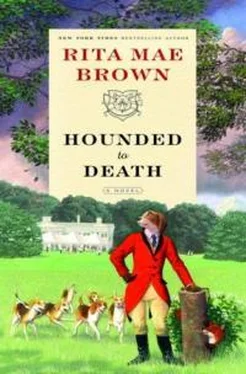That ruled out Grant Fuller. Although the businessman disappeared in Loudoun County, at Sister’s request, Ben bore that in mind. Both knew the foot was older than Grant’s disappearance but this was Sister’s way of saying, “One thing can lead to another.” When the coroner called him he was happy to leave his desk. Now sitting in the squad car, air conditioner humming along with the motor, his curiosity grew stronger. Sure, it was possible that an animal dug up a shallow grave, breaking up the body. But how far would a marauder carry the gains?
He punched in the familiar number.
“Hello?” Sister Jane replied.
“Sister, dogs eat carrion. Do foxes, raccoons, or possums?”
“I don’t think foxes prefer carrion, but if times are hard they’ll eat it. They’re omnivorous, as we are. Raccoons and possums aren’t much interested. Any of the flesh-eating birds will gobble carrion. It’s like candy to them.”
“Such as.”
“Crows are the most obvious. A cardinal wants seeds.”
“Bigger game.”
“Bobcat and bear?”
“Right. I’m wondering how far this foot walked, so to speak. Obviously an animal drug it.”
“Not necessarily.”
“What do you mean?”
“A human could have dropped it.” She couldn’t help herself. “Sheer carelessness.”
He laughed. “Maybe he was putting his best foot forward.”
“That’s really bad.”
“Hey, you need gallows humor in this job.”
“You sure need it on Hangman’s Ridge.” She stopped and thought. “Bears prefer sweets and berries. A bear tearing a human apart and carrying it around is pretty far-fetched. A mountain lion would hide meat in a cache. You’ve seen the caches foxes build? Well, the mountain lion’s is bigger.”
“Would a mountain lion eat carrion?”
“Cats don’t like it.”
“But you said that mountain lions, foxes, and bobcats build caches. The meat rots.”
“Yes, it does decay, but it’s different because it’s covered. Kind of like a primitive crock pot. These animals return to their caches only if they can’t get a fresh kill. It’s not their preferred food, like it is for vultures, say.”
“You don’t think any of those animals would carry a foot a long distance from the rest of the body?”
“No. I don’t think a coyote would either, and we know we’ve got them in this area. If a fox, coyote, bobcat, or mountain lion had torn apart a body, the farthest from Hangman’s Ridge it could happen would be two miles.”
“Lot of territory to cover.”
“Yes, but I live here. I’d have seen the spiral of buzzards. And if I didn’t, Cindy Chandler would, because Foxglove Farm is on the other side of Soldier Road.” Sister took a breath. “Wait a minute. There is an animal with a huge foraging range that will gladly eat carrion and anything else.”
“What?”
“A feral pig. Their usual hunting territory is ten square miles, but fifty is not uncommon if times are hard, and this is a drought summer.”
“If anyone would know about feral pigs, it’s you.”
Sister had nearly been killed by a boar during a hunt. “That boar, the sow, and her piglets are probably still around over by Paradise. It’s remote, much of it wild, so they’re undisturbed. That doesn’t mean there’s a body over there. It only means that’s where we encountered the boar. Could a boar or a sow have traveled here? Sure, but if the animal came by the kennels, we’d know it.”
“Doesn’t mean it didn’t come through After All.” Ben named the Bancroft farm. “There are three other ways up Hangman’s Ridge apart from your farm.”
“Then I think the thing to do is to call the Bancrofts and Cindy. As for the fourth way up Hangman’s Ridge, the south face, it’s mostly sheer rock with a narrow deer path. I’ll check for tracks. That’s all anyone can do at this point; given the drought and the dust, we’ll be damned lucky to get one print. There weren’t any on the ridge, because I looked.”
He stubbed out his cigar. “Just for the hell of it, after I call around I’m going out to Paradise.”
“Wait until dawn.”
“Why?”
“Two reasons. First, dawn is feeding time for the day animals, and the night animals are coming home; they can tell you a great deal. The second reason is dew on the grass. If there’s any hint of a depression, on a track or dirt road, we might see it then. Also, on the meadows, you’ll see the slick spots where animals have walked. It’s not as good as a clear track, but it gives you a sense of the size of the animal and the direction it’s traveling. That’s something.”
“Do you have a shotgun?” Ben asked.
“I do.” She anticipated his next remark. “Better to bring a long-barreled forty-five, though. I don’t have one but if you do, wear it. We’ll be traveling through heavy brush in some spots and a shotgun, which is heavy anyway, will just slow us down. I’ll bring my thirty-eight. Do you mind if Tootie comes?”
“No.”
“She’s got sharp eyes.”
“I’ll meet you at the gate of Paradise at five in the morning.”
“I look forward to greeting the dawn with you.”
“God knows what else we’ll greet.”
CHAPTER 17
“W hat do you suppose they’re doing? You think they’d have the sense to stay home,” the large father of an otter brood said to his mate.
“Checking trails, I suppose. Now that Sister hunts Franklin Foster’s land, she keeps up with it,” his mate replied. “They’ll be hunting in a month.”
“Ah, well, none of my business. Let’s play.” He raced to the creek bank, flopped on his belly, and slid into the deep creek with a splash.
“What’s that?” Tootie asked, her hands light on the reins, for which Aztec was grateful.
“Otters. Very jolly creatures.” Sister smiled.
The creek crossing, ragged and rocky, allowed them to feel the cool air from the water. Ben, accustomed to riding Nonni, a sensible older horse, felt a little trepidation riding Lafayette, Sister’s elegant Thoroughbred.
Lafayette could feel Ben’s thigh muscles tightening constantly, but he bore it with good grace.
Sister rode Matador, glad she’d persuaded Ben to get on Lafayette. If they had driven ATVs back into the huge expanse of Paradise and Franklin Foster’s adjoining property, they’d have scared game. This way they would see more, which could be helpful. Walking was out of the question, for it would take them days to cover what amounted to almost ten thousand acres, some of which touched on federal lands.
Sister’s territory, granted to her by the Master of Foxhounds Association of America, stopped on top of the Blue Ridge Mountains. Skyline Drive was roughly the dividing line. Glenmore Hunt had the west side of the Blue Ridge for Augusta County, with Rockbridge Hunt enjoying the west slopes farther south. The MFHA had settled many territory disputes since its founding in 1907. Fortunately, none of these clubs had fussed at one another in over a century.
“A lot of water here.” Ben noted the depth of the creek.
“Runoff from the mountains. Always water back here, and it’s crystal clear,” Sister replied.
Overhead, a red-shouldered hawk sounded its cry, high-pitched,doubled but not offensive.
Tootie leaned over, once they were on the other side of the creek. “Deer tracks.”
“The great thing about all these streams and creeks is you know the animals will come to drink. It’s a fast way to find out what’s in your territory, assuming the ground’s not loamy sand or baked as hard as clay.” Sister loved tracking, loved anything to do with being outside.
They followed the creek bed, its sides becoming steeper. There was no indication of wild boar, although signs of everything else were in abundance, especially wild turkeys.
Читать дальше












